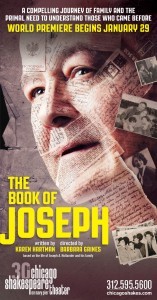If you happen to be in the Windy City sometime in the near future, you might want to check out the Chicago Shakespeare Theater’s production of “The Book of Joseph.” The play, which has its world premiere on Jan. 29 and finishes its run there on March 5, is an inter-generational family saga with strong Holocaust themes and deep Baltimore ties.
Award-winning playwright Karen Hartman based the play on the 2007 non-fiction book “Every Day Lasts a Year: A Jewish Family’s Correspondence from Poland” (Cambridge University Press), written and edited by Christopher R. Browning, Richard S. Hollander and Nechama Tec.
Rich Hollander is a familiar name to many people in Baltimore’s Jewish community. A former Beth El Congregation president, Hollander worked as a news reporter for many years for two daily newspapers (including the long-defunct Baltimore News American) and for WBAL-TV.
His family saga, as chronicled in his book and “The Book of Joseph,” began with a briefcase full of old letters from Eastern Europe discovered by accident in 1986 in the attic of Hollander’s parents, Joseph and Vita.

The catalyst for “The Book of Joseph” was the 30-year-old theater’s founder and artistic director, Barbara Gaines.
Gaines, who directed the play and has ties to Baltimore, had read “Every Day Lasts A Year” and felt strongly that it should be adapted to the stage.
Jmore recently spoke with Hollander about “The Book of Joseph,” which spans six decades, three generations and two continents. A graduate of Johns Hopkins and Northwestern universities, Hollander, 68, lives in Baltimore’s Guilford community with his wife, District Court Judge Ellen L. Hollander, and is the owner of Millbrook Communications.
Tell us about the letters?
It goes under the heading, “Life is pretty good … until it isn’t.” My parents were killed in a car accident in October of 1986. In the process of going through their house in Westchester County, N.Y., I was in the attic and found a briefcase. Inside were hundreds of letters written in Polish and German with big swastikas on them from my father’s mother, three sisters, their spouses and children. There were old passports, family photographs — a potpourri of information.
I didn’t want to deal with the letters at first. I didn’t know what was in Pandora’s Box, and since I didn’t read Polish or German I just put them aside.
About 13 years later, I had them translated.
What did they say?
They are powerful, compelling letters of life under Nazi occupation in Krakow, Poland. From a teenage niece: “I don’t go to the beach or the movies, I don’t read and generally don’t feel alive.” They put a human face on it. This is what a teenager would write.
Then, an adult sister would say things like, “I feel like somebody asked me to sing after my tongue was removed.” Another writes, “Those who are alive often envy the dead ones now, but a man is stronger than it seems and lives with hope that it would be better.”
Some of them are written in code. One sister writes, “We had a visit from your mean old aunt. You’re lucky you are far away and she can’t hurt you.” What she meant was that the Gestapo came to the house. Everything was censored.
What surprised you about the letters?
It’s striking that when the men in the family lost their jobs, they fell apart much more quickly than the women. It was the women who held the family together, emotionally and spiritually. At one point, they got visas to Nicaragua, but then the Nazis did not honor these visas. They were all forlorn, but the women brought a sense of stability and emotional strength, time after time.
What happened to these letter writers?
They all perished. Some went to Bergen-Belsen [concentration camp]. We believe some went to Auschwitz.
Beyond their personal significance, what do the letters say to you about that time in history?
Rarely in history do we hear from the losers. We hear from the victorious generals and the government people. Here, these people were highly educated, enormously articulate, and they showed that even in the worst circumstances, life goes on.
My father’s sister [and] her husband ran away to Russia, and in the midst of all this chaos she found a new love. It was probably against the mores of that era, but my grandmother wrote to say it was OK, that it was fine. Despite the chaos, the uncertainty, life went on, day by day.
What does that look like on stage?
There are multiple themes in the play. It’s about women who are the major movers in this family. There’s a very topical immigration story, with actual transcripts from my father’s immigration hearings. And there is a wonderful love story between my parents, who exchange letters while he is in Europe fighting the war and searching for his family.
It’s a Holocaust story, but it’s not [really] a Holocaust play.
For information about “The Book of Joseph,” visit chicagoshakes.com/plays_and_events/joseph .
Adam Stone is an Annapolis-based freelance writer.
Photos of Richard S. Hollander and “The Book of Joseph” provided by the Chicago Shakespeare Theater





